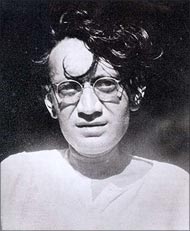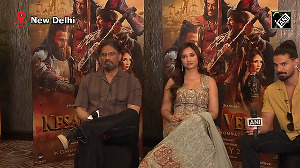 On Saadat Hasan Manto's 100th birth anniversary, National Award-winning lyricist Prasoon Joshi talks about the writer who he first couldn't fathom and was prohibited from reading and yet went on to become one of his favourites.
On Saadat Hasan Manto's 100th birth anniversary, National Award-winning lyricist Prasoon Joshi talks about the writer who he first couldn't fathom and was prohibited from reading and yet went on to become one of his favourites.
Saadat Hasan Manto is an impossible writer to forget. It doesn't matter how many works of his you've read, Manto wedges himself in a part of your memory so thoroughly that you must live with it for the rest of your life.
On May 11 this year, the two countries that the great Urdu writer lived in -- Pakistan and India -- are celebrating his 100th birth anniversary.
Manto, who was born and raised in India -- and having spent some of his most important years in Mumbai (then Bombay) -- moved to Lahore after Partition, has influenced authors of both the countries equally.
Among those who grew up reading Saadat Hasan Manto's works was a young and impressionable Prasoon Joshi.
In an email interview with Abhishek Mande, the writer-lyricist-ad filmmaker who has penned songs for films such as Taare Zameen Par (for which he won the National Award) and more recently Aamir Khan's television outing Satyamev Jayate, tells us about the impact Manto's works had on him and how the author grew on him.
How and when did you first come across Manto?
I must have been in my early teens. I found an old book in Devnagiri, in the Raza library in the small town of Rampur (in Uttar Pradesh). I remember skipping the first one or two pages and picking up the book as it engaged me.
I also distinctly recall that my doing so was frowned upon by a few elders. In fact, one of my uncles remarked 'Ye sab mat padha karo' (Don't read such things!)
I must confess I got rather intrigued by this comment and went on to read it with more involvement.
What was his first work you read?
As I said, it was a collection of his short stories. The power of a good short story is unparalleled. The impact that Manto's writing had on me is imprinted forever I think.
How did Manto affect you first as a young reader and then as a writer?
(Manto's writings) challenged my thinking completely and totally.
Since I was still in my teens and had limited or sometimes no understanding and (scant) exposure to (some of) the subjects he ventured into.
Exploring them left me perplexed at times. Themes of prostitution and hints of necrophilia in (stories such as) Thanda Gosht posed questions to which could not find answers then.
I must say a lot of his work made more sense to me later in my life when I could understand the nuances better. But then there were masterpieces like Toba Tek Singh that immediately made me a fan of his style and depth in his writing, his unabashed portrayals made me bolder as a writer.
You've mentioned that he is one of your favourite authors. What made him your favourite?
(It was) the honesty with which he explored his subjects, the tactile and vivid images he drew and the tightness with which he delivered what he intended to.
It has happened more than once that I have felt happy with my work but happened to read one of Manto's and have gone back to the drawing board.
What story/play of his affected you the most and why?
Toba Tek Singh, Hatak, Khol Do, Thanda Gosht
actually it is very difficult for me to select. His plots seem linear yet there are a lot of different strains woven in. A story like Khol Do initially (seems like) more of a socio-political comment, but the psychological trauma it portrays leaves you numb.
I actually do not dislike anything he wrote, even his memoirs about various people primarily from the creative field.
But, yes, Hatak -- and the character of Sughadhi impacted me deeply. Some have called Manto a misogynist but I would heartily take a contrary point of view. To delve into the psyche of a woman is a complex endeavour for any writer. To portray it so vividly in Hatak through Sugandhi is brilliant.
A recent news report suggested many young Indians are unable to relate to Manto anymore. Why do you think we are unable to pass down the relevance of someone who was so important to at least two generations to the next one?
I don't believe that they have properly read the author. On one hand his writings have captured one of the most tumultuous times in our history as a nation.
The saga of Partition is unfortunately not as well documented as it ought to be. The trajectory of emotion, the depths and the heights of society of humanism that Manto has explored so starkly are in itself, invaluable.
His work is not just contextual but makes a larger comment about us as nations, as societies, as men and women. His work should be seen in a broader perspective.
I think it's a response from a lazy bunch of readers who want everything on a platter. Everything can't be consumed contextually. Sometimes we need to educate ourselves a bit to appreciate great works.
Do you think any Indian author has been quite able to combine biting satire and simple prose to convey the irony that is our nation since Manto?
Yes and no. Yes in bits and pieces some have done it but with such single-minded purity like Manto did? I do not find anyone (who came) close to him.
Manto regularly got into trouble for his outrageous stories. Do you think he would have been an acceptable author today or would we have frowned upon his writing as well?
Counterpoint is very important for someone like Manto to make his point. Today we have a very confused morality in our society. It's cool to be rude, it's cool to be abusive in personal life and popular cinema and music but we lack (the) appetite for serious writing like Manto's. Many might find it too in your face, too stark for the 'gloss over' times we are living in. So I feel we are even less receptive for his kind of approach.
Do you believe we as a society are more liberal today than we were in Manto's time?
It may seem that we are more open-minded and more modern but there is an unsettling aspect underpinning this. I often sense that there's a strain of extreme conservatism that is affecting us deep down. For example, I see a strong need for regional identity emerging clandestinely whilst on the surface it's about liberalism and acceptance.
Also, if Manto was to write today he may have got typecast very quickly. We lack the patience to be able to deep dive into one writer/poet/creative person's work and do justice to it.
Satyadev Dubey once pointed out that the process of creation goes hand in hand with the process of destruction. Manto's life especially in Lahore was a journey towards self-destruction. And yet it was the very journey that gave us some masterpieces including the epic Toba Tek Singh. Do please share with us your views on this.
A writer is cursed not blessed. I feel that writing is a painful process for a true writer. You are churning all your emotions intensely and you have no choice. The weight, the pregnancy of thought of emotions that a writer carries with him or her is not an easy one.
As a writer your quest for truth is never-ending. It will take you to the most uncomfortable situations whether you like it or not. It is your destiny, your compulsion, your purpose. Manto too went through all of it, sometimes fully aware, sometimes led by serendipity
What would you say have been your greatest learning from Manto's works?
Be fearless and honest in sharing your deepest and darkest of emotions.
Image: Saadat Hasan Manto









